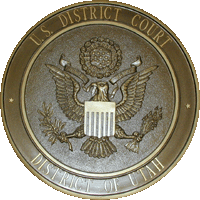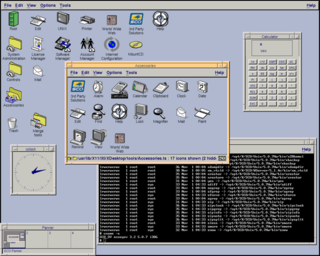
vi is a screen-oriented text editor originally created for the Unix operating system. The portable subset of the behavior of vi and programs based on it, and the ex editor language supported within these programs, is described by the Single Unix Specification and POSIX.

A Commentary on the Sixth Edition UNIX Operating System by John Lions is a highly influential 1976 publication containing analytical commentary on the source code of the 6th Edition Unix computer operating system "resident nucleus" software, plus copy formatted and indexed by Lions, of said source code obtained from the authors at AT&T Bell Labs.

SCO Group, Inc. v. International Business Machines Corp., commonly abbreviated as SCO v. IBM, is a civil lawsuit in the United States District Court of Utah. The SCO Group asserted that there are legal uncertainties regarding the use of the Linux operating system due to alleged violations of IBM's Unix licenses in the development of Linux code at IBM. The lawsuit was filed in 2003, it has lingered on through the bankruptcy of SCO Group and the adverse result in SCO v. Novell, and was reopened for continued litigation by order of a new judge on June 14, 2013. Pursuant to the court order reopening the case, an IBM Motion for Summary Judgment was filed based upon the results of the Novell decision. On December 15, 2014, the judge granted most of IBM's motion, thereby narrowing the scope of the case, which remained open. On March 1, 2016, following a ruling against the last remaining claims, the judge dismissed SCO's suit against IBM with prejudice. SCO filed an appeal later that month. In February 2018, as a result of the appeal and the case being partially remanded to the circuit court, the parties restated their remaining claims and provided a plan to move toward final judgement. In 2021, the case finally ended in a settlement.

The SCO Group was an American software company in existence from 2002 to 2012 that became known for owning Unix operating system assets that had belonged to the Santa Cruz Operation, including the UnixWare and OpenServer technologies, and then, under CEO Darl McBride, pursuing a series of high-profile legal battles known as the SCO–Linux controversies.

Version 7 Unix, also called Seventh Edition Unix, Version 7 or just V7, was an important early release of the Unix operating system. V7, released in 1979, was the last Bell Laboratories release to see widespread distribution before the commercialization of Unix by AT&T Corporation in the early 1980s. V7 was originally developed for Digital Equipment Corporation's PDP-11 minicomputers and was later ported to other platforms.

Caldera International, Inc., earlier Caldera Systems, was an American software company that existed from 1998 to 2002 and developed and sold Linux- and Unix-based operating system products.
USL v. BSDi was a lawsuit brought in New Jersey federal court in 1992 by Unix System Laboratories against Berkeley Software Design, Inc and the Regents of the University of California over intellectual property related to the Unix operating system; a culmination of the Unix wars. The case was settled out of court in 1994 after the judge expressed doubt in the validity of USL's intellectual property, with Novell and the University agreeing not to litigate further over the Berkeley Software Distribution (BSD).

The Unix wars were struggles between vendors to set a standard for the Unix operating system in the late 1980s and early 1990s.

UnixWare is a Unix operating system. It was originally released by Univel, a jointly owned venture of AT&T's Unix System Laboratories (USL) and Novell. It was then taken over by Novell. Via Santa Cruz Operation (SCO), it went on to Caldera Systems, Caldera International, and The SCO Group before it was sold to UnXis. UnixWare is typically deployed as a server rather than a desktop. Binary distributions of UnixWare are available for x86 architecture computers. UnixWare is primarily marketed as a server operating system.
In a series of legal disputes between SCO Group and Linux vendors and users, SCO alleged that its license agreements with IBM meant that source code IBM wrote and donated to be incorporated into Linux was added in violation of SCO's contractual rights. Members of the Linux community disagreed with SCO's claims; IBM, Novell, and Red Hat filed claims against SCO.

SCO v. Novell was a United States lawsuit in which the software company The SCO Group (SCO), claimed ownership of the source code for the Unix operating system. SCO sought to have the court declare that SCO owned the rights to the Unix code, including the copyrights, and that Novell had committed slander of title by asserting a rival claim to ownership of the Unix copyrights. Separately, SCO was attempting to collect license fees from Linux end-users for Unix code through their SCOsource division, and Novell's rival ownership claim was a direct challenge to this initiative. Novell had been increasing their investments in and support of Linux at this time, and was opposed to SCO's attempts to collect license fees from Novell's potential customers.
UNIX/32V is an early version of the Unix operating system from Bell Laboratories, released in June 1979. 32V was a direct port of the Seventh Edition Unix to the DEC VAX architecture.

Xinuos OpenServer, previously SCO UNIX and SCO Open Desktop, is a closed source computer operating system developed by Santa Cruz Operation (SCO), later acquired by SCO Group, and now owned by Xinuos. Early versions of OpenServer were based on UNIX System V, while the later OpenServer 10 is based on FreeBSD 10. However, OpenServer 10 has not received any updates since 2018 and is no longer marketed on Xinuos's website, while OpenServer 5 Definitive and 6 Definitive are still supported.

Sixth Edition Unix, also called Version 6 Unix or just V6, was the first version of the Unix operating system to see wide release outside Bell Labs. It was released in May 1975 and, like its direct predecessor, targeted the DEC PDP-11 family of minicomputers. It was superseded by Version 7 Unix in 1978/1979, although V6 systems remained in regular operation until at least 1985.

The history of Unix dates back to the mid-1960s, when the Massachusetts Institute of Technology, Bell Labs, and General Electric were jointly developing an experimental time-sharing operating system called Multics for the GE-645 mainframe. Multics introduced many innovations, but also had many problems. Bell Labs, frustrated by the size and complexity of Multics but not its aims, slowly pulled out of the project. Their last researchers to leave Multics – among them Ken Thompson, Dennis Ritchie, Doug McIlroy, and Joe Ossanna – decided to redo the work, but on a much smaller scale.
Research Unix refers to the early versions of the Unix operating system for DEC PDP-7, PDP-11, VAX and Interdata 7/32 and 8/32 computers, developed in the Bell Labs Computing Sciences Research Center (CSRC). The term Research Unix first appeared in the Bell System Technical Journal to distinguish it from other versions internal to Bell Labs whose code-base had diverged from the primary CSRC version. However, that term was little-used until Version 8 Unix (1985), but has been retroactively applied to earlier versions as well. Prior to V8, the operating system was most commonly called simply UNIX or the UNIX Time-Sharing System.

The Berkeley Software Distribution (BSD), also known as Berkeley Unix or BSD Unix, is a discontinued Unix operating system developed and distributed by the Computer Systems Research Group (CSRG) at the University of California, Berkeley beginning in 1978. It began as an improved derivative of AT&T's original Unix that was developed at Bell Labs, based on the source code but over time diverging into its own code. BSD would become a pioneer in the advancement of Unix and computing.

Unix is a family of multitasking, multi-user computer operating systems that derive from the original AT&T Unix, whose development started in 1969 at the Bell Labs research center by Ken Thompson, Dennis Ritchie, and others. Initially intended for use inside the Bell System, AT&T licensed Unix to outside parties in the late 1970s, leading to a variety of both academic and commercial Unix variants from vendors including University of California, Berkeley (BSD), Microsoft (Xenix), Sun Microsystems (SunOS/Solaris), HP/HPE (HP-UX), and IBM (AIX).
The history of the Berkeley Software Distribution began in the 1970s when University of California, Berkeley received a copy of Unix. Professors and students at the university began adding software to the operating system and released it as BSD to select universities. Since it contained proprietary Unix code, it originally had to be distributed subject to AT&T licenses. The bundled software from AT&T was then rewritten and released as free software under the BSD license. However, this resulted in a lawsuit with Unix System Laboratories, the AT&T subsidiary responsible for Unix. Eventually, in the 1990s, the final versions of BSD were publicly released without any proprietary licenses, which led to many descendants of the operating system that are still maintained today.
















